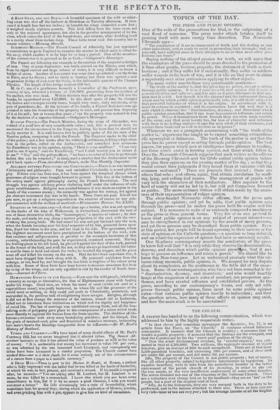TOPICS OF THE DAY.
THE PRESS AND PUBLIC OPINION.
ONE of the evils of the prosecutions for libel, is the outpouring of a vast flood of nonsense. The press under attack betakes itself to praising itself with more energy than discretion. The Newcastle Chronicle says- " The conductors of it are as enamoured of truth and fair dealing as any other individuals, and as ready to assist in promoting their triumph ; and, we may add, have suffered more in their attempts to do so than most other pro- fessions can boast."
Saying nothing of the alleged passion for truth, we will agree that the conductors of the press should be more devoted to the promotion of it than other people, because, properly, the statement of truth is their business ; and if they suffer for it occasionally, they suffer as soldiers suffer wounds in the trade of war, and it is idle on that score to claim a superiority over other professions applying to other objects. The same writer asserts these very questionable positions—. "The truth of the matter is, that the press has no power, except as acting through public opinion. It is as it coincides with that opinion that it gnin '5 general attention and -influence, and it is only as it gives utterance to that opi- nion that it is felt. But though it is the channel and the instrument through which and by which public opinion principally acts, it is still itself subject to that powerful influence of which it is the engine. In accordance with it, must its actions he regulated ; and its conductors know full well that it is only whilst it observes the discrimination, decency, and discretion' which public opinion prescribes, that it can hope to possess an influence, and retain Its power. Vv'hen it transgresses those hounds they are soon made sensible of the error, awl that most keenly too, for loss of character and influence with them is no trifling matter—it saps the very vitals of their existence, and renders them bankrupt as well in fortune as in power."
Whenever we see a paragraph commencing with "the truth of the matter is," experience has taught us to expect something extraordina- rily apocryphal or fallacious. The truth of the matter is not I hat the press has no power except as acting through public opinion. The hest papers, the papers which men of intelligence have pleasure in reading, are those which assist in forming opinion, not those which follow it. Does the Newcastle Chronicle suppose that such writers as the editors of the Morning Chronicle and the Globe collect public opinion before they give their opinions on the passing matter of the day ; or that they would retract their judgments if they found them at variance with the common sentiment ? There are journals that instruct ; there are others that echo ; and others, again, that obtain circulation by scoff- ing, lying, and palling foul names. The management of papers will vary with the characters of their conductors. Men superior to the herd of society will not be led by it, but will put themselves forward as guides. The more ordinary writers will obtain credit by the exact- ness of their representation of vulgar opinion. The clear-headed Newcastle editor affirms, that the press acts through public opinion ; and yet he adds, that public opinion acts through the press—and he makes the press both the engine and the subject. it is nonsense to write of so variously composed a machinery as the press in these general terms. Very few of us can pretend to know what public opinion is on any subject of present interest—we may be strengthened in our opinions by the assent of many persons, anti yet those persons may be dissentient from public opinion. Even at this period, few people will be found agreeing in their notions of the state of opinion on the Catholic question,—a question so long debated, and on which the expression of opinion had been so anxiously sought.
Our Northern contemporary asserts the conductors of the press to know full well that "it is only while they observe the discrimination, decency, and discretion which public opinion prescItes, that it can hope to possess an influence and retain a power." We should like to know this Non-tong-paw. Let its understand precisely what this vir- tuous ruling monarch, public opinion, is. We suspect we may dispute about its complexion, as the gentleman in the fable did of the came- leon. Some of our contemporaries, who have not been remarkable for "discrimination, decency, and discretion," and who would heartily laugh at the suggestion of such rules of conduct, are prosperous gen- tlemen, and have created influence and established powers. As the press, according to our contemporary's terms, can only act with power through public opinion, there must be some public opinion extra—that virtuous public opinion hostile to indecorum ; and then the question arises, how many of these offsets of opinion may exist, and how the main stock is to be ascertained?


















 Previous page
Previous page